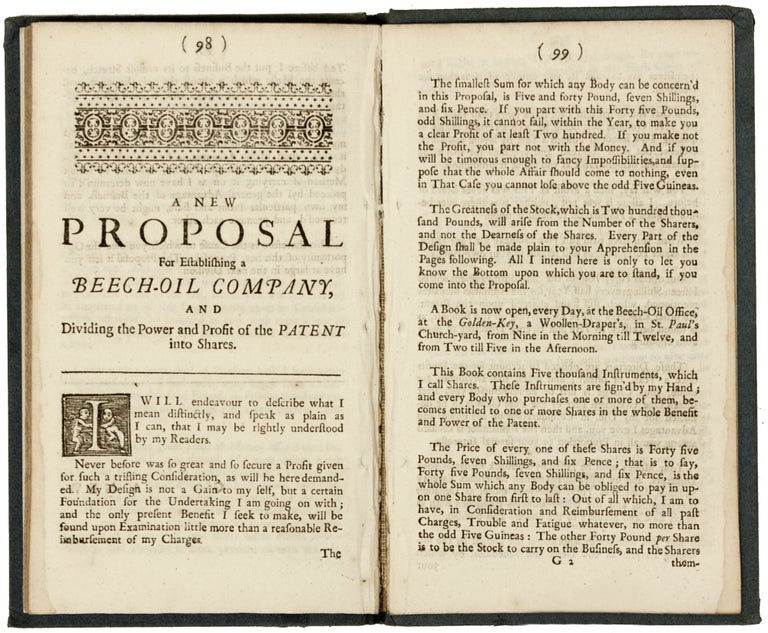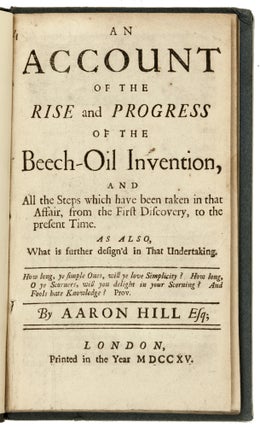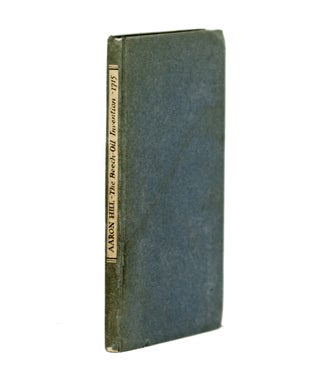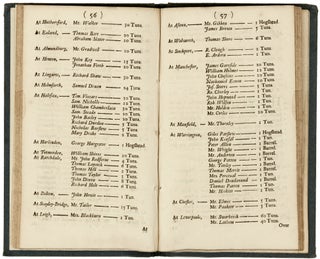An account of the Rise and Progress of the Beech-Oil Invention, and all the Steps which have been taken in that Affair, from the First Discovery to the Present Time . .
8vo. [19 x 11 cm], 112 pp. Bound in paper-covered boards with author and title in a modern hand on paper label. New endpapers. Light toning to title page and some leaves. Small holes in gutter, not affecting text. Otherwise good. First edition of a treatise, chiefly comprising letters and essays, providing an in-depth discussion of the discovery and promulgation of a technique for extracting oil from beech nuts. Beech nuts were particularly plentiful in England and their oil was both simple to extract and useful as fuel and for many other functions. A valuable commodity, oil played an important role in England's everyday life, and Hill's desire to develop a domestic alternative to imported oil was not unusual for his time, as Hill's contemporaries contemplated extracting oil from poppies, sunflowers, and even radishes (Gerrard, p. 44). Aaron Hill (1685-1750), travelled through Europe and the East, where he learned of alternative sources of fuel and oil to those customary in his native England. Upon his return home, on a trip to Devon in 1712, Hill noticed that the beech trees were thick with must. To use the natural resource, he decided to set up beechnut-oil factories. In 1714, he published An Impartial Account ... of a New Discovery ... to make Oil ... from the Fruit of the Beech-Tree, where he argued that England could produce enough oil not only to meet its domestic demands, but also to export oil to Holland and Sweden. The 1714 publication was followed by a series of pamphlets on the subject, of which this work, published in 1714, is one of the longest and fullest (Gerrard, pp. 42-44). In this pamphlet, Hill proposes several ideas for a stock of 200,000 pounds divided between 5,000 shares. The book sheds substantial light upon the rhetorical life of an early 18th century corporations and is a precursor of an operating agreement for shareholders. It lists the names, organized by regions, of the customers who prepaid (including the tonnage ordered) and continues with marketing strategies including the kinds of explanations one should use with potential clients. Hill's venture proved unsuccessful: one of his last pamphlets on the subject from late 1716 "records the closing stages of the scheme, the quarrels among the annuitants, and their attempts to file a bill in Chancery charging the patentee and their directors with a scheme to defraud them" (Gerrard, p. 45). In addition to being an entrepreneur, Aaron hill was a prolific writer, --as well as a literary figure involved in the London theater and opera scene. The pamphlet seems very rare on the market: we were not able to locate another example offered for sale since 1975. *Kress-Goldsmith, 5206; Gerrard, Aaron Hill: The Muses' Projector, 1685-1750 (2003), pp. 39-60.
Price: $1,950.00




